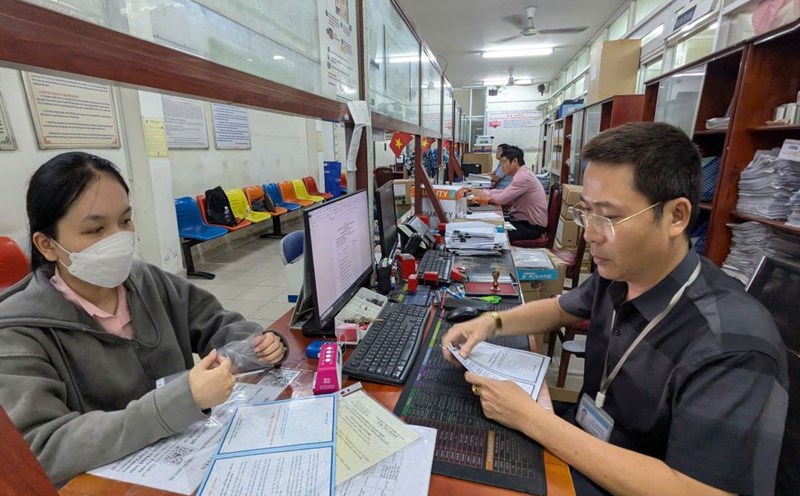Ms. Dang Thi Ha, 31 years old, from Khoi Chau district (Hung Yen), has been in Hanoi for more than 10 years, working for her relatives in Long Bien district (Hanoi). Since working in 2012, getting married and having children, Ms. Ha's salary has been paid from 6 million VND/month to 15 million VND/month as at present.
"My daily job is to record the import/export books at the fruit warehouse of my aunt and uncle. When I first started working, I worked all day, from 5am to 8pm, and the uncle and aunt kept me occupied with food. When I got married, I worked in the morning or afternoon shifts. Morning shifts are from 4am to 1pm, afternoon shifts are from 2pm to 10pm. I change shifts once a week, said Ms. Ha.
After more than ten years of working as a "family", Ms. Ha only knows the month of salary, has not signed a labor contract, has not participated in social insurance or any other regime. Until giving birth, no matter how much support she received from her aunt and uncle for 10 million VND and how much time off she did not receive that month's salary, Ms. Ha realized that she was still at a disadvantage compared to participating in and receiving maternity benefits.
At the end of 2024, a company near Ms. Ha's inn in Long Bien district recruited warehouse staff, she applied and was accepted to work. "In November, I was signed a labor contract, paid for social insurance. I found it assured, later when I gave birth to a second child, I would be maternisticated as prescribed, enjoy maternity expenses ... to participate in social insurance, later I was able to take pension and support the cost of old age.
According to Ms. Ha, when participating in compulsory social insurance, she was shared by the company about paying monthly, helping workers reduce participation costs while the benefits were guaranteed and complete.
Mr. Nguyen Van Hai also has 6 years of freelance work in Hanoi. From his hometown in Nho Quan district (Ninh Binh), he came to Hanoi in 2019 to work as a waiter at a restaurant in Yen Nghia ward (Ha Dong, Hanoi). In September 2024, Mr. Hai had dengue fever and had to be hospitalized for 8 days of treatment. As a freelancer without health insurance, after the treatment, Mr. Hai had to borrow more from friends at the same workplace to have enough money to pay hospital fees.
Realizing that a job without a labor contract or social insurance would be very disadvantageous, I decided to find a job in companies and factories. In November 2024, I applied to work as a worker at a company in Yen Nghia Industrial Park with a starting salary of 6.5 million VND/month, plus allowances, each month I received nearly 9 million VND.
Compared to my old job, my income is not as high, but I am fully covered by social insurance. Not to mention, working at the company will receive salary increases over the years, increasing income when working overtime. More importantly, I think that the savings are sometimes not enough to cover when sick if I continue to work freely. Participating in social insurance also helps me get a pension in the future," said Mr. Hai.
Regime for employees when participating in compulsory social insurance
Pursuant to Article 4 of the Law on Social Insurance 2014, it is stipulated as follows:
Social insurance regimes when participating in compulsory social insurance include:
- Sore;
- Pregnancy;
- Work accidents, occupational diseases;
- Retirement;
- Death
The Social Insurance Law 2024, effective from July 1, 2025, basically retains these benefits.
Regarding the social insurance contribution rate, the Social Insurance Law 2014 stipulates that the contribution rate accounts for 26% of salary, of which employees contribute 8%, employers contribute 18%.
The Social Insurance Law 2024, effective from July 1, 2025, stipulates that the contribution rate accounts for 32% of salary, of which employees pay 10.5%, employers pay 21.5%.











